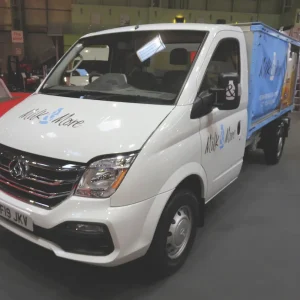When owned outright a company vehicle is often one of the highest-value assets a business may have.
And when it comes to replacing the vehicle, the owner is faced with the issue of how to dispose of the van not only in the most cost-effective manner but also in a way that takes into account the drain on their own time. Compared to just a few years ago there are a number of paths that can be taken, all with their own pros and cons.
If buying a new (or indeed used) van from a dealer to replace your old vehicle, part-exchange would be the option taken traditionally. Advantages include a seamless changeover that can take place on the day of delivery, the settlement of any outstanding finance being taken care of, and there is no ‘come back’ from, for example, an unhappy private purchaser.
Andy Picton, chief commercial vehicle editor at valuations experts Glass’s, says: “It’s such an easy way of disposing of the vehicle, and, of course, the equity in the van can act as a down payment on a finance agreement for the new van.”
James Davis, commercial vehicle director at auction house Manheim, adds: “This permits the dealer to adjust margins across the part-exchange with the margin they have in the new/used replacement vehicle.”
Also extolling the virtues of a part-exchange arrangement is independent commercial vehicle dealer Barry Clarkson of Clarkson Commercials in Glasgow. He says: “There is no question that online car/van-buying channels have had an impact on the trade. However, there is definitely a swing towards van retailers fighting back and promoting the ease of traditional trade-in methods and offering extremely strong money for the correct retail-quality stock when offered as part-exchange.”
Citing the potential time and stress involved, Clarkson continues: “We find that the busy small business owner, who is the mainstay of our customer base, really doesn’t have the time to be bothered with selling their existing van privately, and auctions can be a daunting process to the uninitiated. However, a highly reputable van retailer will work with honesty and integrity and construct a package tailored to your exact needs and demands.”
Do it yourself
Despite the pitfalls, there may still be a temptation to sell the van privately. This method is likely to cut out the ‘middleman’ and their profit margin, and is often regarded as the way to achieve the best return. Advertisements in the local press, eBay, Auto Trader or other online services are used to solicit interest, with potential buyers arranging to view the van and discuss a deal.
Brand director at Auto Trader Chris Penny tells What Van?: “Selling privately typically offers the best return over any other channel, but it’s important it’s marketed in the right way to the right people.
“When building your advert, think like a buyer. What is it that you would want to see? Whether you’re buying a van, a car, or even a washing machine on Amazon, you’d look for detail and transparency. Your ad shouldn’t be the exception. Include plenty of clear images, even of scuffs or scratches, and be as descriptive as possible. Get these simple steps right, and you’ll get the return your van deserves.”
Manheim’s Davis offers some tips to help secure a fast and lucrative sale when advertising privately on the internet: “In the online world confidence is key, irrespective of what you are buying. Make sure the vehicle is sensibly valued according to other similar vehicles online and watch out for canvassers who make contact promising a sale for an additional fee. If the seller does not get any enquiries the likelihood is it’s too expensive. Everything has a price.”
Raising the prospect of time constraints and ‘hassle’, Davis says: “Viewings may be out-of-hours as well as inside the working day; for a business seller to down tools and meet the buyer is often not convenient. Other concerns are taking payments by cash as well as insurance cover for a test drive. Picking buyers up from the local train station or running them to the bank or local post office to tax the vehicle all add time and hassle for the seller.”
Private sales can take some time to secure and this may have timing implications on the replacement vehicle being bought because the capital contained within the old vehicle isn’t freed until it is sold. There is the potential for having to have both the new and old vehicles insured while awaiting a successful sale and in addition, although generally having few legal rights when buying privately, a dissatisfied purchaser will often seek redress for faults on the vehicle discovered after purchase.
Online, outright
Recent years have seen the appearance of companies who will, after an initial online valuation followed by physical inspection, buy the vehicle outright. The advantages to the seller are clear: a quick, easy and trouble-free transaction. As the business model of these organisations generally relies on profit made at auction, the offer made will often be significantly lower than that anticipated by the seller, especially when comparing advertised sale prices for vans similar to their own.
However, for those who want the quickest sale with the least effort, it may well be worthy of consideration.
Highlighting potential pitfalls of a private sale Richard Evans, head of technical services at WeBuyAnyCar.com and sister brand WeBuyAnyVan.com, tells What Van?: “Selling the company van privately could generate the most amount of money for a small business but the downside is the time it may take. Most small businesses will want to focus on their day-to-day work, rather than dealing with strangers who may want to buy their van but will haggle on the price. In addition, there are the associated advertising costs when selling privately and no guarantees that a buyer will be found.”
Recognising the specific needs of the SME, Evans says: “We can collect vans from business premises, as we understand it’s not always possible to bring trade vans into branch for appraisal, especially if an SME is looking to sell a small fleet.
“We also aim to go above and beyond, offering added extras, such as finance settlement and decal and logo removal, which can take precious time, when all a business owner wants to do is get into their new vehicle and back to work as quickly as possible.”
Contract hire
The issue of vehicle disposal can be eradicated by acquiring vans on a contract-hire basis. At the end of the agreement the vehicle is collected by the lease company and, as the operator has no title, that’s often the end of the matter. While the prospect of a fixed holding cost may be attractive, what may put the SME off leasing is the prospect of end-of-contract charges for damage to the vehicle that fall outside of what is considered fair by the finance company.
Hammer Time? Duncan Ward, BCA’s LCV operations director, outlines the advantages of selling at auction…
- Logistics of moving a van that may now be uninsured or untaxed: “A team of trade plate specialists handle single-vehicle collection.”
- Preparation and valet: “Vehicles looking their best attract significantly higher buyer interest, leading to more first-time conversions and an improved sales performance… improving stock churn and cash flow.”
- Setting a reserve: ‘“Condition, age, mileage, configuration, payload and power all come into play when valuing. Auction firms use big data to set reserve prices, factoring in daily price movements, demand patterns, pipeline supply and retail demand.”
- Payment: “Guaranteed, secure payment to the seller within five working days of the sale.”





